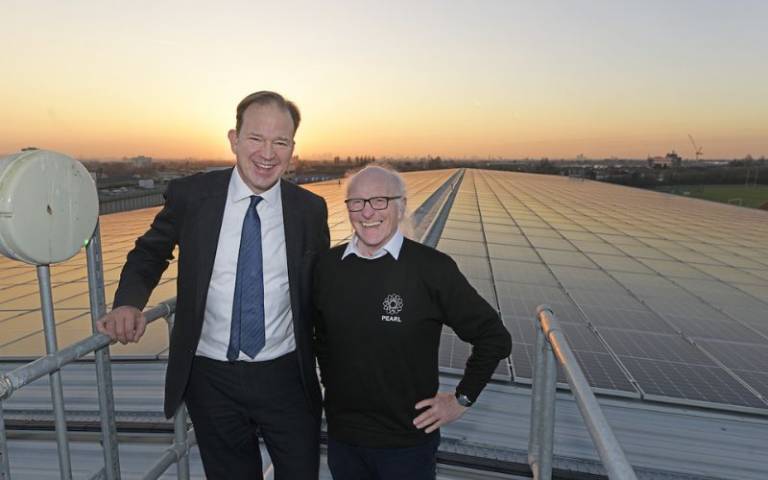Government minister visits UCL PEARL transport laboratory
8 February 2023
Decarbonisation and technology minister Jesse Norman toured UCL’s PEARL facility this week, as the laboratory hosted a roundtable with key stakeholder groups discussing e-scooters.

Mr Norman, a UCL alumnus, was welcomed by Professor Nick Tyler, Director of the UCL Person-Environment-Activity Research Laboratory (UCL PEARL), a unique space in Dagenham, east London, created to explore the ways in which people interact with their environment.
The minister was convening a roundtable discussion with stakeholders in transport, law enforcement and disability advocacy on issues surrounding e-scooters, to address their legal status, how they fit within existing road traffic laws, alongside safety concerns, particularly for blind and partially sighted people.
The MP, who is Minister of State in the Department for Transport, responsible for decarbonisation and technology, then toured the innovative UCL facility guided by Professor Tyler to gain insight into UCL’s science and research capabilities.
Researchers demonstrated how testing facilities at PEARL enable them to conduct e-scooter experiments to examine the sounds that might be used for e-scooters to alert pedestrians.* The project aims to discover the best way for e-scooters to effectively announce their presence to people with a range of capabilities without increasing street noise levels.
Professor Nick Tyler (UCL Civil, Environmental & Geomatic Engineering) said: “It was great that the Department for Transport decided to come to UCL PEARL to hold its consultation meeting with stakeholders about e-scooters. We showed Jesse Norman a number of our recent projects aimed at accessibility and inclusion, decarbonisation, and of course our net zero carbon building powered by the solar panels on the roof.”
Since its opening in 2021, UCL PEARL has provided a space for the public, researchers, regulators, and implementers to see what operation and design ideas would look, feel and work like at a reduced cost to on-street trials. Measuring 4,000m squared and 10m high, researchers can create life-sized, controlled condition environments such as a railway station, high street or town square in the facility to examine people’s interaction with the environment and each other.
At UCL PEARL, researchers can study people’s interactions with environments at a micro-scale, such as brain activity or emotional response, and at macro scale the design of streets, city blocks and stations. In addition, the senses of participants (what they see, touch, hear, smell, or feel) in response to environmental design or to dynamic conditions such as explosions can be studied.
In 2021, UCL PEARL received an A+ rating for energy performance, making it UCL’s first net zero carbon building. In 2022, it was awarded the Chartered Institute of Highways and Transportation/Atkins Award for Innovation and Technology, the New London Architecture Award for the Sustainable Building of the Year and the Building Awards Net Zero Building Award.
Links
- *Developing a universal sound to alert road users to e-scooters
- UCL Pearl
- Professor Nick Tyler's academic profile
Photo
- Credit: Parsons Media Ltd
Media Contact
Molly Bridge
E: molly.bridge [at] ucl.ac.uk
 Close
Close

